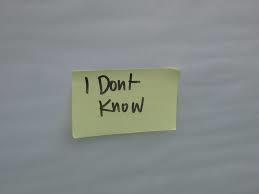September 4th, 2018
The Power of Intellectual Humility
Scott Hippe, MD
Don’t ever be afraid to say, “I don’t know.”
Those were parting words from one of my physician mentors in medical school. I had asked him for wisdom in making the transition to residency. “In my career, I’ve seen hundreds of physicians who cannot bring themselves to say those words. They are generally the ones who get burnt out. They are the ones that shout at you when you consult them over the phone. They are the ones who leave medicine, one way or another.”
My mentor’s point was to stay intellectually humble. The practical application to clinical medicine is obvious. We’ve all learned about the different types of biases that lead to medical errors and diagnostic misses. As trainees, we have seen physicians who exhibit too much hubris make mistakes.
I am reminded of my mentor’s comments now that July has arrived and a new class of interns has started their training. Their enthusiasm for residency and the pursuit of learning is a breath of fresh air. Along with the enthusiasm has come a multitude of “I don’t knows”:
- “I don’t know where to go when we start in the hospital tomorrow.”
- “I don’t know how the attending likes case presentations.”
- “I don’t know my dictation number.”
- “Can my patient eat?”
- “Can I eat?”
- “What is the best flavor of enema?”
- “Do I need an enema?”
- “She brought her service animal into the hospital, but she didn’t say it was a python.”
- “I don’t know what to do about his pain — he told me he’s allergic to everything but Dilaudid.”
Residency is endlessly humbling, but interacting with interns has shown me how much I have grown as a physician. I can answer all of the questions mentioned above, and even a few more.
One thing is getting harder to say
 As my years of residency have gone by, and I have made the transition to senior resident, it has gotten harder to say “I don’t know.” Just like my mentor predicted. Not knowing things on the wards or missing something in clinic stings my pride more now than it did when I was an intern.
As my years of residency have gone by, and I have made the transition to senior resident, it has gotten harder to say “I don’t know.” Just like my mentor predicted. Not knowing things on the wards or missing something in clinic stings my pride more now than it did when I was an intern.
The most common feedback I give to medical students and interns is to be decisive with their plans. This was also the feedback I received on my own medical student rotations. I imagine it is feedback most learners receive. Being a competent clinician requires synthesizing large amounts of data and committing to a plan of action. But it is also possible to take “decisive” too far. A phrase has stuck with me:
“Sometimes wrong, never in doubt.”
A surgeon said this, while preparing to take a patient with abdominal pain to surgery for suspected appendicitis. In this particular instance, appendicitis is exactly what the patient had. It was one of those times to be decisive, and rapidly decisive. But whether through conscious effort or subconscious tendency, we often take “fake it until you make it” too far. We become insecure and isolated clinicians hiding behind façades of confidence. This tendency leads to worse outcomes.
Benefits of intellectual humility
Although “I don’t know” gets harder to say, I am convinced it is one of the most important phrases in the practice of medicine. Embracing the intellectual humility necessary to utter those words has many benefits:
- Encouraging curiosity: this leads to broader differentials and more effective diagnosing
- Counterbalancing “intervention bias”: the tendency of clinicians to do something — anything! — when the best course of action might be to do nothing
- Effective teamwork: clinicians who admit they don’t know everything are more open to the input of others and more likely to see the patient’s big picture.
- Better education: A safe environment, where learners are empowered to disclose their gaps in knowledge, allows educators to address those gaps more effectively.
For newly minted resident physicians, my advice is to embrace “I don’t know.” You will do yourselves and your patients a great service. I will continue to say those three words as well, no matter how sharply it hurts my pride. If any of this inspires passion, positively or negatively, please leave a comment. I am looking forward to communicating with you this year through the Insights blog.
–Scott




I’m pretty clear I’d like to say something, but, gee, I dont’ know?
As an internist with over 30 years experience, let me reference related responses (which as chief resident you presumably already know, but still….): Often, a patient will present and want to know if what he has is a serious problem. Sometimes reassurance that it appears not to be, even if I clearly state I’m not sure what’s going on, provides satisfaction. Similarly, sometimes a patient will have something wrong that a layman could be worried is a severe, potentially life-threatening problem. After history and examination, I still may not know what is going on. However, I tell the patient I start with the most serious possibilities, which he doesn’t seem to have, and work my way down. I then say that I am not sure what the problem is, but I can reassure him about what the problem probably ISN’T, and go from there (return if worse, etc.).
I appreciate Dr. Hippe’s insightful comments. I think they speak to the nature of working in environments like academia where learning opportunities are abundant and at the same time competition is stiff and expectations are high.
I especially appreciate his comments on encouraging curiosity and promoting an environment where people can learn.
I would also like to comment that sometimes humility can be perceived as lack of confidence and historically -some aspects of medical culture take pride on “shaming” residents and junior staff members in attempts to make them look less competent by more senior staff members. I have felt on several occasions that saying “I don’t know” has been perceived as shameful – because the expectation is that I “should and ought” to know the answers. Ironically- saying I do know something was perceived as either arrogance/being a “know-it-all” or making up something in an attempt to look confident! I was aghast when people quickly look at their phones to verify what I’m saying- it was hurtful to say the least. I also felt helpless- like if I knew something I’d be rejected as the know-it-all and if I didn’t I would be shamed for not being “good enough.” I would also like to add that as we bridge a generational gap in our own medical education system- both senior physicians who have more “life” experience and junior members who may be right out of training may feel the need to justify their competency and existence in a competitive job market. The inherent culture sometimes breeds a sense of feeling the need to justify your worthiness to the next person and sometimes saying “I don’t know” is perceived as “getting by”. I have been in circles of peers and faculty who would then challenge you to say “well look it up” in a disdainful tone of voice as though if you didn’t want to find out- that too was shameful! I don’t think there is an easy solution- I do promote self-honesty and encourage others on my team to be honest as far as their work-up, assessment, what they know and don’t know. And to his point- we are always learning. Thanks for being open to discussion!
I agree with everything you say when the discussion occurs among medical professionals. With patients, I prefer the sentence “I don’t know yet”. Some patients can be troubled when a doc says “I don’t know”. They might wonder if their doctor is good enough, or if they are convinced of their doctor’s excellence, they might worry they may have a disease which may never be diagnosed and adequately treated Adding the word “yet” to the end of “I don’t know” inspires hope, as it acknowledges you haven’t given up and feel that an answer will be found. Hope may be the most important gift we can give to patients. Intellectual honesty represents a worthy goal because you are telling the truth. Intellectual honesty combined with hope is better yet, as it conveys truth with love.
The intellectual humility in medicine, although it is not very followed. For me it is a wise and sure way.
It is the best advice that can be given to a student.
I congratulate you. I totally agree with you.
Greetings.
Excellent words, full of wisdom. Thanks for sharing
As a non-physician health professional and an almost perpetual patient, I am often asked for advice about how to ‘assess the quality’ of a medical doctor.
My answer always includes that a good physician will readily say “I don’t know”, followed by “…but, I have some ideas about how to find the answer and I’d like you and I to work together to find the answers you need”.